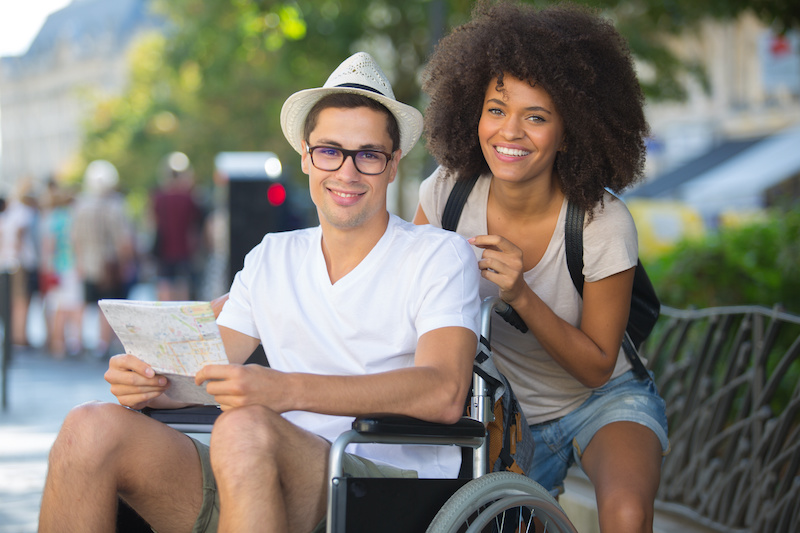Here are some tips to make traveling with a disability easier.
The Air Carrier Access Act (ACAA) makes it illegal for airlines to discriminate against passengers because of their disability. Airlines are also required to provide assistance, including providing wheelchair or other guided assistance to board, deplane, or connect to another flight; seating accommodation assistance that meets passengers’ disability-related needs; and assistance with the loading and stowing of assistive devices.
The TSA provides detailed information for traveling with disabilities and medical conditions, including:
- Passengers with intellectual disabilities or developmental disabilities, such as Down syndrome or autism, can be screened without being separated from their traveling companions if traveling with one.
- Canes, Braille note-takers and other aids must undergo X-ray screening. A TSA officer will inspect the item if it cannot fit through the X-ray machine.
- You and your service dog/animal will be screened by a walk-through metal detector. You may walk through together or you may lead the animal through separately on a leash. If you opt not to be screened by the walk-through metal detector, you will undergo a pat-down.
- Passengers with mobility disabilities can be screened through the advanced imaging technology, metal detector, or a pat-down.
- You are not required to remove any hearing aids or cochlear implants. Additional screening, including a pat-down or inspection of a device, may be required if it alarms the walk-through metal detector or advanced imaging technology.
Visit www.TSA.gov/Travel/Special-Procedures for more detailed information.
Plan Ahead
To ensure the most hassle-free flight possible, the U.S. Dept. of Transportation recommends including these items on your planning list:
- Confirm your accessibility needs with all airlines involved in your journey.
- Check your flight status before arriving at the airport.
- Check into your flight and arrive at the airport as early as possible to allow time to check any baggage, go through the security screening, and board the plane.
- Be alert to gate and flight time changes and notify airline personnel of your need to move to a different gate, if necessary.
- Because airline personnel may not be familiar with your particular assistive device, consider:
- Providing written instructions detailing the disassembly, assembly, and stowage of your device; and
- Taking a picture of your device before your flight to capture its condition.
- Airlines must have a priority space for at least one folding manual wheelchair on aircraft with 100 or more seats; you must request to pre-board the flight in order to have the opportunity to stow your wheelchair in the aircraft cabin.
- If you need to use your assistive device during the flight, you can request that the flight crew help you retrieve it from the stowage space.
- Carry medicine or other assistive devices like syringes as a carry-on item. Passengers, at times, get separated unexpectedly from checked baggage. If you do decide to carry medication or other assistive devices with you on board, the items cannot be counted towards your carry-on baggage limit.
- Bring photocopies of instructions about the assembly and disassembly of wheelchairs and other assistive devices when you access air transportation may be a good idea. You can provide that information to carrier personnel storing or checking your wheelchair or assistive device.
The U.S. Department of Transportation has developed a series of disability-related training materials to assist passengers traveling with disabilities better understand their rights. Click the appropriate link below to learn more:
- Wheelchairs and Other Assistive Devices
- Assistance Moving Throughout the Airport
- Seating Accommodations
- Service Animals
Go easy
Travel can be exhausting under any circumstances for the person with the disability and their traveling companions. Be sure to plan plenty of down time for naps and rebuilding stamina.
COVID Is Still An Issue
As with everything else, COVID has disrupted the travel industry so it’s even more important to plan ahead.
The Centers For Disease Control shares these general tips:
- Get up-to-date with your COVID-19 vaccines before you travel.
- Consider getting tested before travel.
- Follow CDC’s recommendations for wearing masks in travel and public transportation settings.
- Get tested after travel if your travel involved situations with greater risk of exposure such as being in crowded places while not wearing a high-quality mask or respirator.
- Check your destination’s COVID-19 Community Level before traveling. State, tribal, local, and territorial governments may have travel restrictions in place.
That’s a lot, but taking care of it ahead of time can protect your health and save you time.
Related:
- 10 Tips for Traveling with Physical Disabilities
- Curb Free with Cory Lee blogs about traveling the world in a wheelchair.
- Mobility International USA has helpful articles on charging wheelchair batteries and taking a service animal abroad.
- The Smart Traveler Enrollment Program (STEP) is a free service to allow U.S. citizens and nationals traveling and living abroad to enroll their trip with the nearest U.S. Embassy or Consulate. There’s a section under Traveler Information that allows you to enter any relevant information about a physical limitation.
- 7 Travel Agencies for special needs travel
- Accessible Journeys runs trips for those in wheelchairs.
- The Society for Accessible Travel & Hospitality is another resource for finding agents and companies.
- Airline Passengers with Disabilities Bill of Rights – U.S. Department of Transportation (U.S. DOT)
- The Air Carrier Access Act and Passengers with Disabilities– U.S. DOT
- The Air Carrier Access Act and Service Animals– U.S. DOT
- Aviation Consumer Protection- Traveling with a Disability– U.S. DOT
- The ADA & Accessible Ground Transportation– ADA National Network
- Reasonable Modifications to Policy, Practice & Procedure in Public Transportation – ADA National Network
- Questions and Answers Concerning Wheelchairs and Bus and Rail Service– U.S. DOT, Federal Transit Administration



